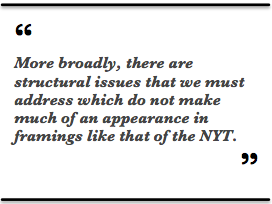We must ask complex questions and be willing to handle equally complicated answers.
As sad and horrific as it is, when the media exploits the tragic shooting of a child to rally support for an overly simplified political position, you know something is wrong. Reality is always more complex—and loathing the Taliban is fast becoming idiomatic language.
We must unequivocally condemn the shooting of Malala Yousafzai, an intelligent child, alive to her reality, and an advocate for social change. We must support efforts towards female education in Taliban-heavy areas and everywhere. But, we must also discover the facts and question the simplistic morality the New York Times presents: the bad Taliban, painted in broad strokes as an irremediably barbaric, authoritarian, misogynist, monolithic entity and the rest of us united in our desire to put an end to obscurantist views.
“What can Pakistan and its allies do to either work with the Taliban on reform initiatives, or stop it from terrorizing civilians?” the NYT asks.
Working with them, as the question suggests, seems rhetorical, even disingenuous, given the paper’s own general reporting on Pakistan and especially when the attempted murder came at the heels of a political party’s march to Waziristan to do something just like that. The real message is “Only stopping them will work. You can not engage with criminals.”
 Surely, these self-righteous fictions, endorsed and constructed by some of the most powerful media houses, justify a certain way of thinking which is as dangerous as that of the TTP. Against the backdrop of the NYT’s other coverage of Pakistan including its editoral stance on drones as a necessity, the segment on Malala appears to buttress a fiction designed to shut down criticism of drones and ignore how many civilians die in these strikes. Drones, too, are criminal.
Surely, these self-righteous fictions, endorsed and constructed by some of the most powerful media houses, justify a certain way of thinking which is as dangerous as that of the TTP. Against the backdrop of the NYT’s other coverage of Pakistan including its editoral stance on drones as a necessity, the segment on Malala appears to buttress a fiction designed to shut down criticism of drones and ignore how many civilians die in these strikes. Drones, too, are criminal.
Since Malala is the starting point for this debate, let’s look at what was she is saying about the nature of war, Let’s examine what happened in her hometown in Swat after Fazlullah declared war on girls’ education, and the Pakistan military responded with artillery. Did Swat ever
return to normalcy? How successful were government efforts to rebuild it?
And, there are also questions about the state’s role in the diminishing opportunities for education. Why, for instance, were NGOs and the government not the spokespersons for education reform in Swat? The state has done little to provide education reform in Swat or for that matter other parts of Pakistan where the TTP finds its recruits. Women’s education is not simply an issue in the north-west of Pakistan. Sindh, in particular, lags behind even parts of FATA.
Pages: 1 2



[…] progressive struggles more generally have been sacrificed to propaganda. Ashfaq urges us not to shy away from asking complex questions and understanding the structural causes of our […]
Hi,
i want to let you know some important news regarding bara khyber agency situations.i am resident of that area and i have seen those condiotions from very near.i want to tell you something thtat might be you will not know about that,,,,to whom i should tell i do not know but its based on reality.
thanks